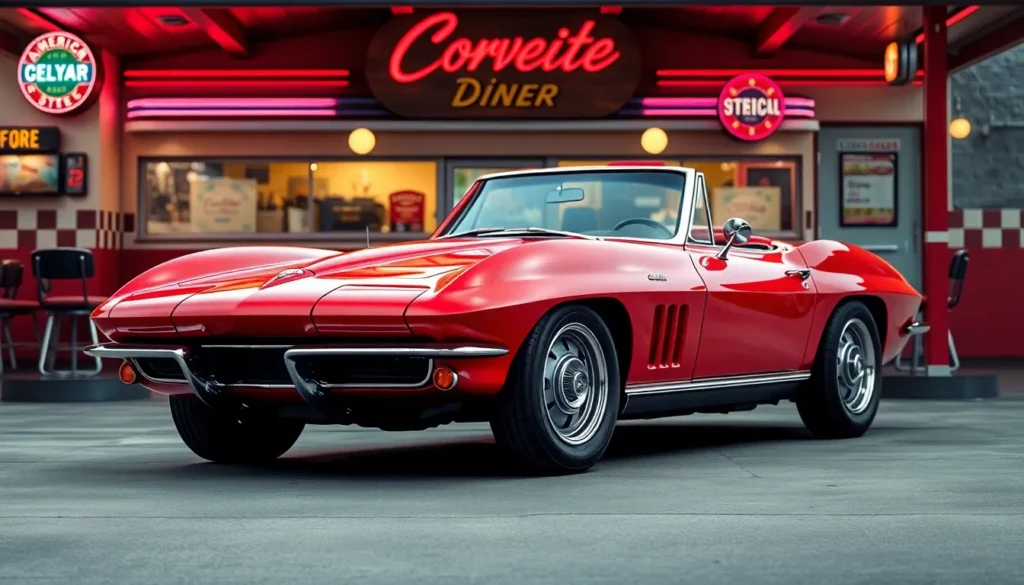When it comes to iconic cars, few brands have left a mark quite like General Motors. From the sleek lines of the Corvette to the rugged charm of the Chevy pickup, GM has been a staple on American roads for decades. But as the automotive world shifts gears, some beloved models have hit the brakes for good.
Table of Contents
ToggleOverview of General Motors Iconic Cars
General Motors has produced several iconic cars that have left a lasting mark on the automotive industry. The Corvette stands out as a symbol of American performance, recognized for its sleek design and impressive speed. This sports car captured the hearts of enthusiasts since its debut in 1953, becoming synonymous with innovation and style.
Another significant model, the Chevrolet Silverado, showcases GM’s expertise in the pickup truck segment. Since its introduction in 1998, the Silverado has consistently ranked among the top-selling trucks in the United States. Known for its reliability and durability, this vehicle has become a staple on both work sites and family drives.
The Pontiac Firebird is also a celebrated model, gaining fame for its bold performance and cultural presence in the 1970s and 1980s. Its unique design and powerful engines resonate with muscle car aficionados, making it a memorable part of GM’s legacy. After over three decades, the Firebird’s discontinuation marked the end of an era, but it still enjoys a dedicated fan base.
Chevrolet Camaro contributes to GM’s reputation for exciting cars, debuting in 1966 as a competitor to the Ford Mustang. Renowned for its sporty appeal and powerful engine options, the Camaro remains popular among performance car enthusiasts.
These vehicles represent a fraction of GM’s impactful history in the automotive landscape. As the industry adapts to changing consumer preferences and technology, the legacy of these iconic cars shapes the brand’s future even as some models are phased out.
Reasons for Discontinuation

The discontinuation of iconic GM vehicles stems from various factors, including market trends and shifts in consumer preferences.
Market Trends
Shifting market trends significantly influence automotive production decisions. Electric vehicles now dominate discussions within the industry, prompting manufacturers like General Motors to prioritize sustainability. Reports from automotive analysts indicate a 50% increase in electric vehicle sales from 2020 to 2022, pushing traditional combustion engine models to the sidelines. Honda, Ford, and Tesla lead in electric innovations, highlighting competition. Meanwhile, the global push for reduced emissions has driven automakers to adapt their portfolios to meet regulatory standards. General Motors responds by reallocating resources toward developing electric and hybrid models. As a result, some iconic cars face discontinuation to make room for more eco-conscious options.
Consumer Preferences
Changing consumer preferences also impact vehicle discontinuation decisions. Modern buyers seek versatility, technology integration, and fuel efficiency. In surveys, over 70% of respondents expressed a preference for cars with advanced tech features, like connectivity and driver-assistance systems. Furthermore, urbanization trends encourage the adoption of smaller, more efficient vehicles. Sales data reveal a 30% decrease in demand for large sedans over the past five years, indicating the decline of traditional models. Brand loyalty shifts, particularly toward electric and crossover vehicles, underline this evolution. General Motors must align with these preferences, leading to the discontinuation of beloved models that no longer resonate with today’s consumers.
Impact on the Automotive Industry
Discontinuation of iconic General Motors vehicles marks a significant shift in the automotive industry. This shift not only influences the company but also sets new precedents for its competitors.
Sales and Revenue Implications
Economic implications arise from discontinuing established models. Disappearance of popular cars may lead to short-term sales declines for GM as loyal customers adjust to newer offerings. Revenue may take a hit as the brand phases out high-performing models like the Chevrolet Camaro. Research indicates that as much as 20% of revenue can stem from flagship models, highlighting their importance. Transitioning to electric vehicles presents new revenue opportunities, offsetting losses from discontinued cars. Analysts project substantial growth in electric vehicle sales, anticipating a 70% increase by 2025. This growth mitigates potential drawbacks from sales reductions, encouraging investment towards future innovations.
Brand Legacy and Heritage
Discontinuing beloved models impacts General Motors’ rich history and brand identity. Iconic vehicles like the Corvette and Chevrolet Silverado represent decades of American automotive culture. These cars evoke strong emotions and foster brand loyalty among dedicated fans. Departing from these models risks eroding the unique heritage GM has cultivated since its inception. Legacy considerations necessitate that new innovations embrace the spirit of traditional vehicles. Companies can incorporate classic design elements and performance characteristics into modern adaptations. Maintaining a balance between tradition and innovation is essential for preserving GM’s historical significance while adapting to the changing automotive landscape.
Emotional Response from Fans
The discontinuation of iconic vehicles by General Motors stirs deep emotions among fans. Loss of these models evokes a blend of nostalgia and sadness, reflecting their significant place in automotive history.
Nostalgia and Sentiment
Fans often recall cherished memories tied to their favorite GM vehicles. Driving down the highway in a Corvette, for many, symbolizes freedom and adventure. Memories of family road trips in Chevy pickups resonate with a sense of belonging. Emotional connections span generations, with children learning to drive in their parents’ beloved Camaros. Enthusiasts cherish these cars not only for their performance but for the experiences they represent.
Community Reactions
Social media channels buzz with passionate discussions and heartfelt tributes. Fans express disappointment over discontinued models while sharing stories of their own vehicles. Community forums reflect grief mixed with appreciation for GM’s legacy. Some fans take to local car shows to showcase their cherished GM models, celebrating their uniqueness. Many car clubs mobilize to support one another, emphasizing loyalty to the brand despite sadness over the changes. GM’s decision, while pragmatic, leaves a void filled with shared love for these iconic cars.
Future of General Motors
General Motors is pivoting toward electric vehicle development in response to industry shifts. The company’s strategic focus includes a commitment to sustainability and reducing carbon emissions. New models reflect advanced technology while aligning with changing consumer preferences.
Analysts predict a substantial growth in electric vehicle sales, estimating a 70% increase by 2025. This optimistic projection suggests that GM’s investment in electric and hybrid vehicles could result in significant revenue opportunities. Existing flagship models like the Chevrolet Camaro, despite being discontinued, still leave a lasting impact on the brand’s history.
Consumers increasingly prioritize versatility, fuel efficiency, and innovative technology. Adaptation to these demands drives GM’s decision-making, allowing the company to remain competitive. Market conditions dictate the necessity for brands to evolve, indicating a crucial need for GM to meet modern expectations.
Community reactions vary in response to discontinued models. Many fans express nostalgia, recalling cherished moments with iconic GM cars. Social media platforms host passionate discussions where enthusiasts celebrate the legacy of these vehicles. The emotional connection to these cars remains strong, underscoring their significance in American automotive culture.
While discontinuation marks an end, it also opens doors for new opportunities. GM’s focus on future technologies positions the company as a leader in the electric vehicle market. The commitment to innovation ensures continued growth, reflecting a forward-thinking approach in an ever-changing industry.
The discontinuation of General Motors’ iconic vehicles marks a pivotal moment in automotive history. As the industry shifts toward electric and hybrid models, GM embraces innovation while acknowledging the emotional ties many have to their beloved cars. The legacy of models like the Corvette and Camaro will forever resonate within American culture, serving as a reminder of the brand’s rich heritage.
While change is often met with nostalgia, GM’s commitment to sustainability and adaptation ensures its relevance in a rapidly evolving market. As enthusiasts celebrate the past, they also look forward to the future, where new technologies and vehicles will continue to shape the automotive landscape. This transition not only reflects changing consumer preferences but also positions GM as a leader in the electric vehicle movement, promising exciting developments ahead.



